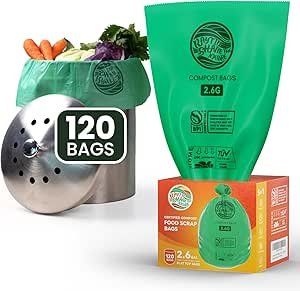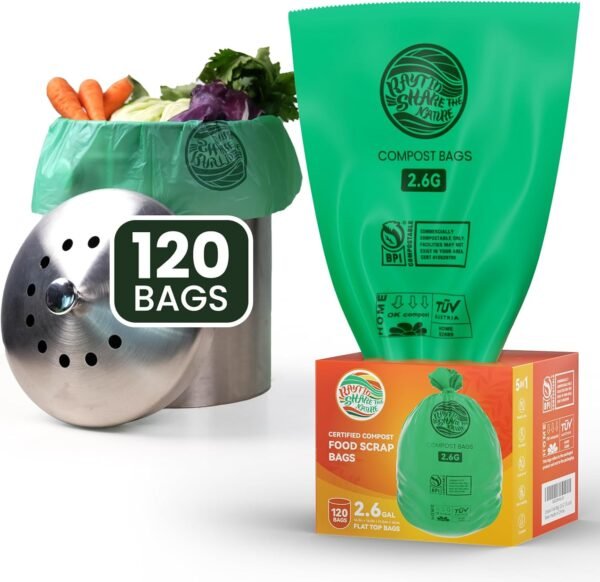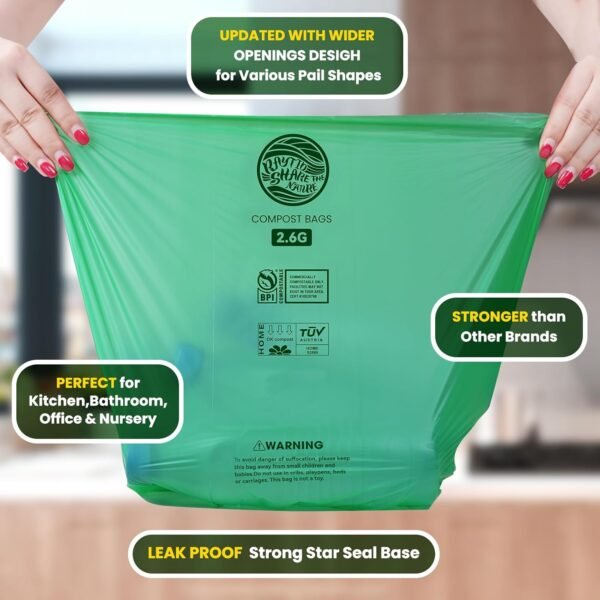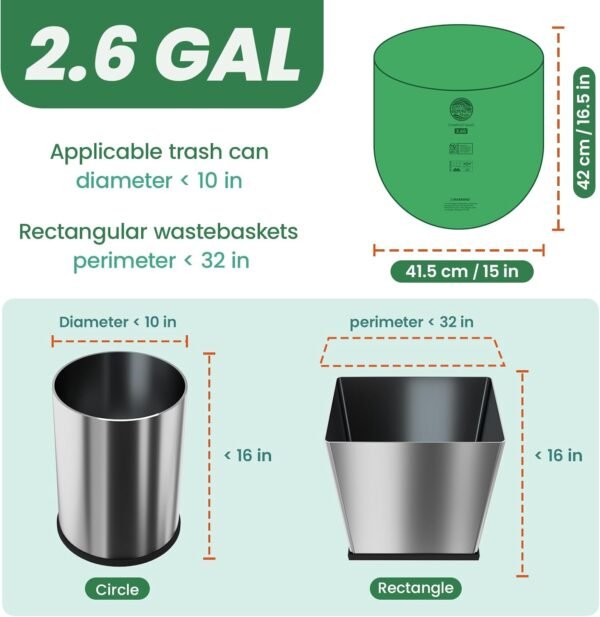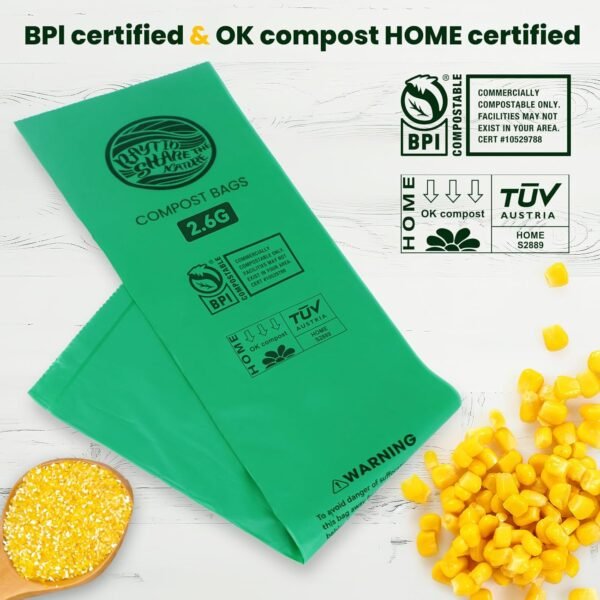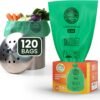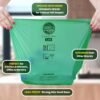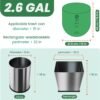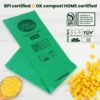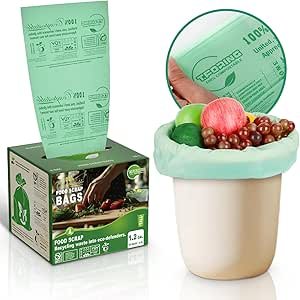Raytid Compost Bags Review Best Small Kitchen Compostable Trash Bags Durable Eco-Friendly
Raytid Compost Bags Review Best Small Kitchen Compostable Trash Bags Durable Eco-Friendly
- Stretchy and durable material allows these bags to hold oversized loads without tearing or leaking.
- Made entirely from plant starches, they contain no polyethylene, making them truly eco-friendly.
- Certified to degrade fully within 180 days, they break down into humus, CO2, and water in standard compost piles.
- Perfectly sized for small kitchen bins, they fit countertop compost containers with ease and convenience.
As an Amazon Associate I earn from qualifying purchases.
Description
Positive Features of Compostable Trash Bags for Kitchen Use
Having tested the RAYTID Compostable trash Bags 2.6 Gallon Compost Bags for Kitchen Countertop Bin 1.3,2,3, Gallon, 120 Count, I must say the environmental benefits stand out immediately. These bags are made from 100% plant starches with no polyethylene involved, which means they truly break down in a standard compost pile within 180 days. The certification by US BPI ASTM D6400 and Europe OK Compost Home standards gives me confidence that these bags won’t linger in landfills for years. I appreciate how the bags stretch and expand to fit larger loads without tearing, which is a common problem with other compost bags I’ve used before.
- Fully compostable and biodegradable according to strict environmental standards
- Durable yet flexible, stretches without punctures or leaks
- Made from natural plant starches, non-toxic and safe for my family
- Comes in a convenient 120 count roll, perfect for frequent kitchen use
Drawbacks in Everyday Use
Despite the many positives, I noticed a few limitations while using these bags daily. The size fits most small kitchen bins, but if you have a larger countertop compost bin, these might feel a bit snug. Also, I found that the bags need to be stored in a cool, dry place and used within about 10 months of purchase. Forgetting this detail once caused a bag to feel brittle, which was frustrating. The bags also don’t hold up well if exposed to excessive moisture before use, and the thinner material means you have to be gentle when handling wet scraps to prevent early tears.
- Smaller bag size may not suit all kitchen bins
- Must be mindful of storage conditions to maintain durability
- Thinner material can tear if overloaded or handled roughly
Kitchen Convenience and Usability
Using these bags for my kitchen scrap bin was surprisingly hassle-free. The 2.6-gallon capacity seemed just right for daily food waste, from vegetable peels to coffee grounds. The bags’ stretchability allowed me to stuff in more than I expected without worrying about leaks or breaks, which is a huge plus. I also appreciate how the bags fit snugly into my small countertop bin, making cleanup easier and more sanitary than using loose scraps or paper bags. My kids found it easy to toss their fruit peels in without making a mess, and the strong seams prevented leaks even when the bags got heavy.
Environmental Impact and Certifications
The fact that these bags meet rigorous certifications such as US BPI ASTM D6400 and European OK Compost EN 13432 standards is a huge selling point for me. It means these bags are not just compostable but will actively degrade into humus, CO2, and water within six months in a proper compost environment. Unlike many plastic bags labeled “biodegradable” but still harmful, these are genuinely eco-friendly and help reduce the plastic footprint in my household waste. Using them has made me more conscious about waste disposal and composting habits, especially since they don’t contain any harmful polyethylene.
Price Worthiness Compared to Similar Products
Given the quality and certifications, these compost bags offer good value for the eco-conscious buyer, although they come at a slightly higher price point than generic kitchen trash liners. The durability and stretchiness justify the cost for me, especially since I don’t have to worry about leaks or double-bagging, which often happens with cheaper options. When I compared these to other compostable bags on the market, many lacked the same certifications or tore easily during use. This product strikes a balance between cost and high-quality materials, making it a smart spending choice for anyone serious about reducing plastic waste in the kitchen.
Product Comparisons with Market Rivals
Compared to other compost bag brands I’ve tried, these excel in biodegradability and strength. Some competitors offer larger bags, but those often come with less reliable compost certifications or use blends containing polyethylene, which defeats the purpose. Others are sturdier but lack the environmental credentials that these bags have. A popular rival product, for instance, tends to tear more easily and isn’t certified for home composting, making it better suited for commercial composting setups only. The RAYTID bags’ combination of certified compostability and usability makes them stand out, especially for home use.
Perks of Using Certified Compost Bags
One of the highlights of using these compost bags is the peace of mind knowing they won’t harm the environment after disposal. The certifications are not just marketing fluff—I’ve seen firsthand how quickly they break down in my backyard compost. The plant-based material means I don’t have to worry about toxic residues or microplastics contaminating the soil. Plus, the bags are nontoxic and safe to handle, which matters when you have kids or pets around. This feature alone makes them a worthwhile switch from traditional plastic liners.
- Certified compostability ensures safe degradation
- Environmentally responsible, made from renewable materials
- Safe handling with no toxic chemicals
- Supports sustainable kitchen waste management
Areas for Improvement
While these compost bags tick many boxes, a couple of adverse aspects could be addressed in future versions. The smaller size means they aren’t a universal fit for all kitchen bins, which might require some users to purchase multiple sizes or brands. Also, the shelf life of around 10 months demands careful storage; otherwise, the bags become brittle and prone to tearing. It would be great if the manufacturer could enhance the material’s stability over time or offer resealable packaging to extend freshness. Lastly, while the bags stretch, the thinner material might not suit all compost waste types, especially very wet or heavy scraps.
- Limited size options restrict universal use
- Requires specific storage to maintain durability
- Material could be reinforced for extra wet waste
- Shelf life might be short for infrequent users
Using these bags has been a practical step toward reducing plastic waste in my kitchen, but like anything, they come with trade-offs. My experience shows that while the environmental benefits and certifications are impressive, some handling and storage considerations must be kept in mind to get the best out of these compostable trash bags.
